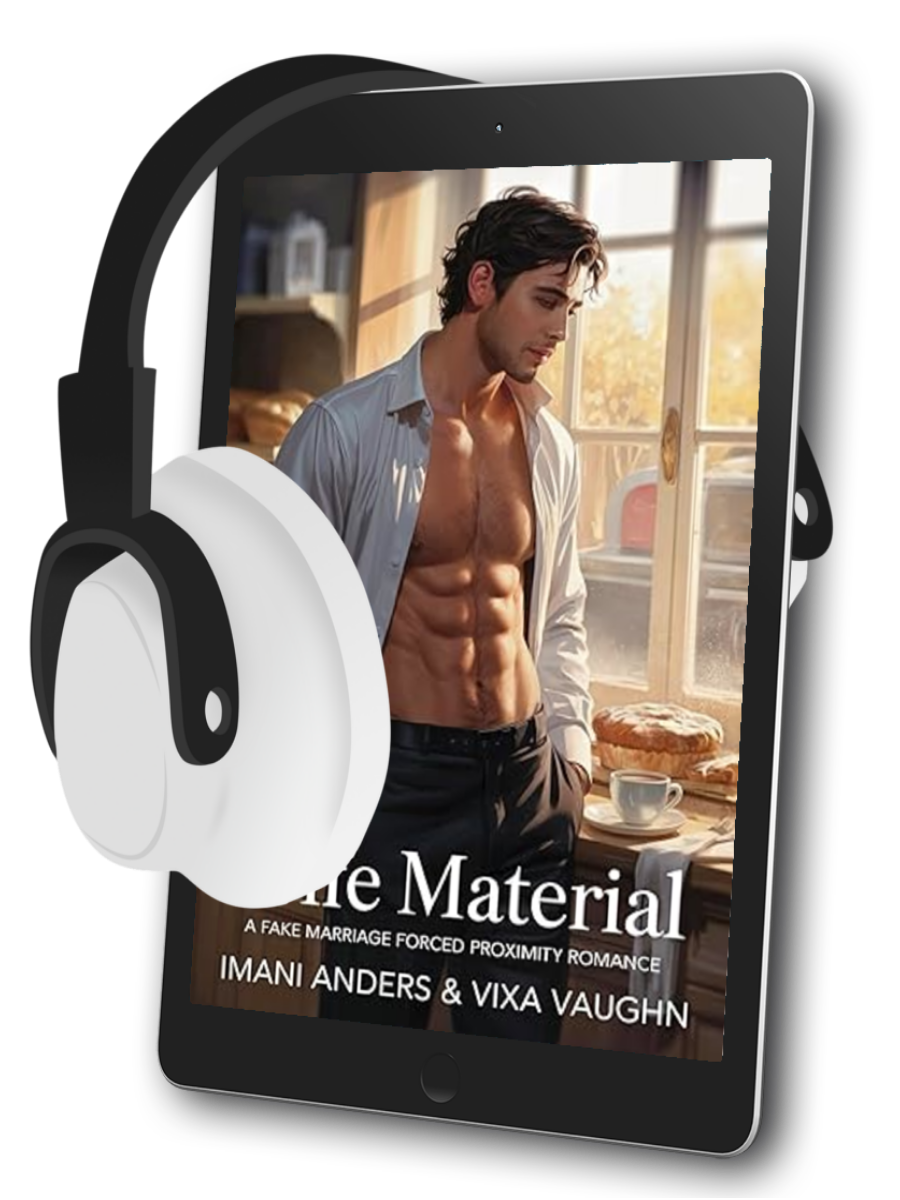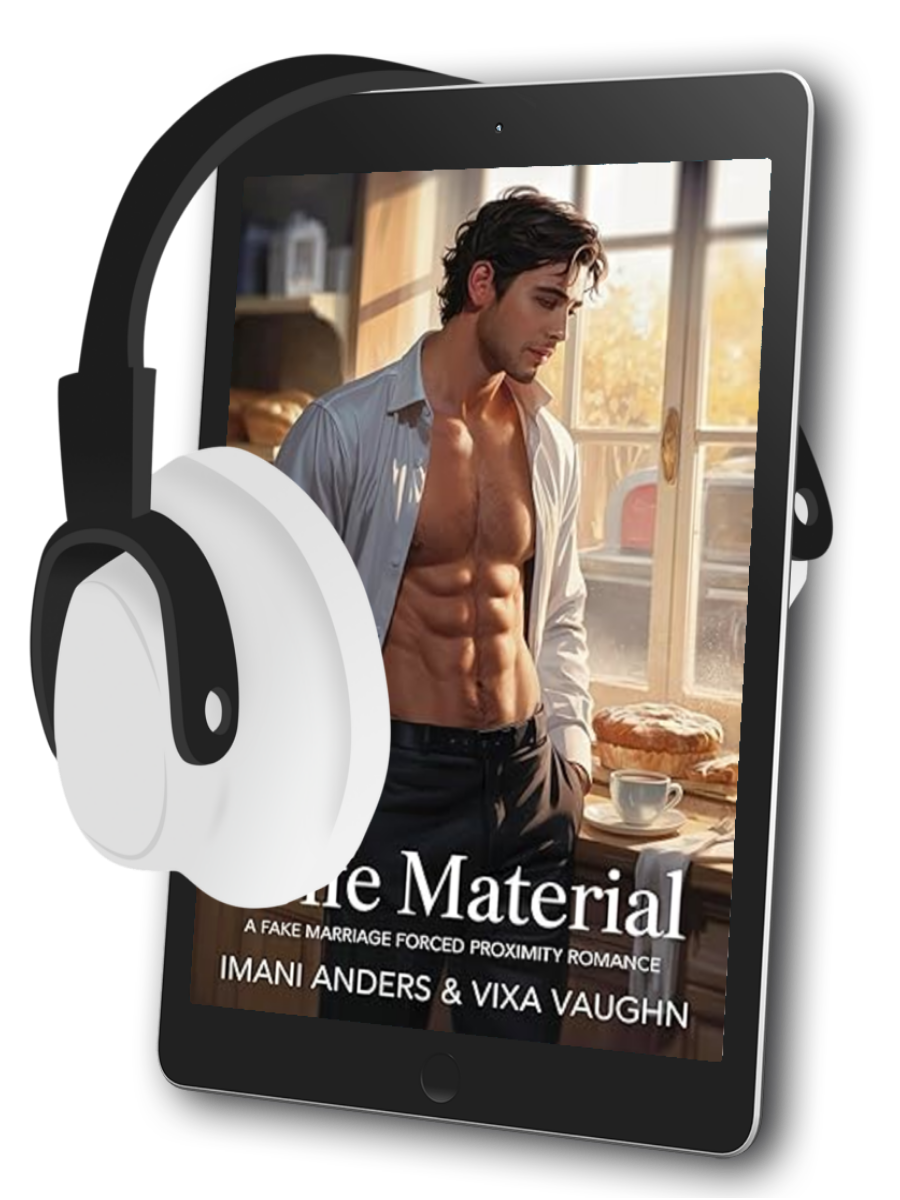Vixa Vaughn Romance Books
Wife Material
Wife Material
Couldn't load pickup availability
- Buy the ebook or audiobook
- Receive download link via email
- Send to preferred e-reader and enjoy!
She’s messy. Loud. Covered in flour.
And now she’s my wife.
I marry her to solve a problem. She marries me to survive one.
No feelings. No drama. No future.
That’s the deal.
But Selene moves into my world like a storm—tripping over my rules, humming in my kitchen, and looking at me like I’m not a man made of stone.
She’s not perfect.
She’s chaos in a sundress.
And she’s making it harder to remember why this marriage was supposed to be fake.
Because the longer she stays…
The more I want to keep her.
Even if loving her risks everything I’ve built.
Even if losing her might break the only heart I swore I didn’t have.
Read on for fake marriage, forced proximity, grumpy/sunshine, late-night slow burns, and one cold billionaire who never saw her coming. HEA guaranteed.
Look Inside
Look Inside
Chapter 1
Selene
The smell of butter and sugar hangs heavy in the air, thick and sweet, clinging to the walls like a blessing. I push a loose curl out of my face and lean into the rhythm of the morning, my hands folding croissant dough in sharp, practiced movements. Roll. Fold. Turn. The flour rises in lazy clouds around me, catching the first weak shafts of Parisian sunlight slipping through the cracked window panes.
Outside, the street is still asleep. Only the occasional rumble of a delivery truck or the sharp chirp of a bird breaks the silence. Inside Petit Soleil, it’s just me, the dough, and an old jazz record crackling from the battered speaker in the corner. Louis Armstrong, if I had to guess — that familiar gravelly croon melting into the soft whistle of the coffee pot on the back counter.
I move through the tiny bakery on autopilot, checking proofs, setting timers, sliding warm pastries onto cooling racks. The floor squeaks under my sneakers — a loose board I keep meaning to fix — and the rich, dark steam of the first espresso of the day curls up in the cool air like a lazy dancer.
In these hours before the city wakes, Paris feels like mine. Not the shiny postcard version tourists come to gawk at, but the real one: imperfect, crumbling, achingly beautiful. It hums in my blood, wraps around my heart.
This is the dream. My dream. Alive. Breathing. Rising like yeast under my fingertips.
The knock startles me so badly I nearly drop the tray of pain au chocolat.
Three sharp raps — official, impatient. I frown, dusting flour off my apron, and hurry toward the front. The bakery smells like heaven, golden and warm, but a chill sneaks under the door, pricking at the skin on my neck.
When I swing it open, the man standing there looks like he’s never smiled in his life. Dark gray suit. Slicked-back hair. A plastic badge flashed so fast I barely catch the words. Office français de l’immigration et de l'intégration.
"Random inspection," he says, his French clipped and cold.
I force a polite smile, stepping aside. My heart is already tap-dancing against my ribs. Random inspections happen sometimes, sure. But not often. And never without a warning letter.
He steps inside, boots clicking on the scuffed tile, and starts asking questions. Name. Date of arrival. Visa status. His eyes are cool, calculating, skimming over the bakery like he’s assessing damages.
When he asks for my papers, my hands fumble with the envelope I keep tucked under the register. Birth certificate. Visa. Renewal forms. The usual stack.
He flips through them with the slow, cruel precision of someone looking for a reason to say no. His brow furrows slightly, and he taps one page with a blunt finger.
"This document," he says, switching to English so sharp it cuts, "is missing confirmation."
I blink at the form. It looks fine to me. But he’s already shaking his head, lips tightening.
"There will be... deportation proceedings if you cannot correct this." His voice is almost bored. Like he’s ordering coffee, not ripping the ground out from under me.
The word deportation clangs in my ears, so loud I almost miss the rest. A looming expiration date. A ticking clock. A cold, invisible hand clamping down on my chest.
I manage to nod — polite, robotic — as he hands me a card and tells me to call for a review meeting. Then he leaves, taking the clean, sweet air with him.
The door clicks shut. I stand frozen, clutching the wrinkled envelope like a life raft, the buttery perfume of croissants filling a space that suddenly feels too big and too small all at once.
My fingers tremble so hard I can barely shove the immigration papers back into the battered envelope. The edges crumple under my touch, the plastic sleeve slipping free and fluttering to the floor like a white flag of surrender.
I sink to my knees to grab it, but the motion unbalances me, and my hip knocks into the cooling rack behind me. In slow, horrifying motion, three perfectly golden trays of croissants tip sideways. I reach for them, uselessly clawing at the air, but gravity wins.
They crash to the floor with a sickening thud — flaky, buttery masterpieces splattering across the tile like casualties of a war I don’t even understand.
The first tear breaks loose before I can stop it. Hot and humiliated, it cuts a clean path through the flour dusted across my cheek. I swipe at it with my hand, smearing my face into something pathetic and wild.
This bakery is my life. My dream. My heartbeat. And now, with one missing piece of paper, it all feels like a house of cards built too close to an open window.
My chest tightens until breathing feels like trying to suck air through a straw. I can’t stay here. I can’t be trapped inside these four walls, smelling butter and loss and failure all tangled up together.
I kick the door open with my foot, the old brass bell clanging wildly against the frame, and stumble into the street with nothing but my apron, my sneakers, and my panic chasing me down the cobblestones.
The air outside slaps me awake — sharp and brisk and smelling faintly of wet stone and fresh bread. I gasp, drawing it in greedily, but it does nothing to stop the spinning in my head or the pounding in my ears.
I don’t have a plan. I don’t even have a destination. I just run.
The streets of Montmartre blur around me: pastel shopfronts, wrought-iron balconies dripping with winter vines, a man in a beret strumming a guitar I can’t hear over the roar in my mind.
When the pigeon comes at me, I lose it.
It bursts up from the curb with an explosion of feathers and angry cooing, and I shriek — an embarrassingly high-pitched noise that bounces off the bakery windows and startles a group of tourists nearby.
I veer hard to the right, trying to dodge the flapping demon bird, and slam hip-first into a postcard stand outside a souvenir shop. A cascade of glossy photos of the Eiffel Tower and Notre-Dame rains down around me, sticking to my apron, fluttering into the gutter.
The street vendor shouts something sharp and angry in rapid-fire French. I gasp out a frantic apology, fumbling with the postcards, but he’s already waving me off with a scowl, muttering curses I don't need to translate.
Humiliation, cold and oily, slides under my skin.
I yank my apron strings loose and shove them into my pocket as I stumble away, head down, ignoring the stares, the snickers, the judgment burning into me.
Paris, the city I loved, the city that once felt like magic, now feels like it's spitting me out like a stale baguette someone left too long on the counter.
I don’t stop running until I’m standing in front of Camille’s building, chest heaving, shoes scuffed, hands trembling — and the undeniable, sickening truth sitting heavy in my gut.
I’m losing everything. With no idea how to stop it.
I hammer my fist against Camille’s door, more from sheer desperation than any real hope she’s home. My forehead presses against the peeling wood, breath ragged, eyes burning. For a second, all I hear is the distant hum of Paris traffic, the faint clink of dishes from a café down the street. Then the door swings open so hard I almost fall inside.
Camille Rousseau — barefoot, wearing a Rolling Stones T-shirt and a pair of pajama shorts that say “Crêpe Happens” — stares at me, a half-empty wine bottle dangling from her fingers. Her eyebrows shoot up.
"Mon dieu," she breathes, stepping aside. "You look like you lost a fight with a croissant truck."
I stumble in, trailing flour and postcards, and collapse onto the nearest piece of furniture — a lumpy green couch that has seen better decades. The smell of wine, incense, and ancient carpet wraps around me like a slightly judgmental hug.
Without a word, Camille thrusts the wine bottle into my hand. I take a long, burning gulp. It’s terrible. I don’t care.
"Talk," she demands, plopping down next to me, tucking her legs under her like a nesting bird. "Start from the beginning. And do not skip details. I live for the drama."
The words spill out in a tangled, tear-soaked mess — the knock at the bakery, the missing document, the word deportation ringing in my ears like a death knell. Camille listens with wide, horrified eyes, making little gasping noises and muttering colorful curses under her breath.
By the time I finish, I’m hiccupping and clutching the wine bottle like a life preserver.
Camille snatches it back and takes a defiant swig. "Okay," she says, voice firm. "We are not panicking. Panicking is for Americans and pigeons. We are French-adjacent women of action."
Somehow, against all odds, I snort out a watery laugh.
Camille grabs a pad of sticky notes from the coffee table and starts scribbling furiously: "Fake marriage?" "Bribe an official?" "Join a mime troupe and disappear underground?"
I choke on my next sip of wine, coughing so hard I nearly topple off the couch.
"I’m serious!" she insists, tapping the list with her pen. "Desperate times call for creative solutions."
Her ridiculousness should make me feel better. It should lift the crushing weight pressing down on my chest. Instead, it cracks me open.
Tears slide down my cheeks again, silent this time, carving tracks through the flour dust still clinging to my skin.
"I can’t lose this," I whisper. The words are so small, so broken, they barely make it past my lips. "I can’t start over. Not again."
Camille’s face softens. She slides closer, wrapping her arms around me in a tight, unflinching hug.
"You won't," she says fiercely, her voice muffled against my shoulder. "You’re Selene freaking Carr. The sun itself gets jealous of you. Paris just hasn’t figured that out yet."
I cling to her like a lifeline, letting the grief and terror wash over me in shuddering waves.
Somewhere in the mess of emotions, I hear her mutter, half-joking, half-serious, "All we need is a gorgeous Frenchman who needs a tax break and a fake wife. Easy."
I laugh, a wet, broken sound. As if life hands out miracles like baguettes at a corner café.
Still, a tiny ember lights in my chest — ridiculous, impossible, desperate. But there.
And desperation has a funny way of making even the most insane ideas feel possible.
Later, after Camille has fallen asleep half-upright against a pile of throw pillows, I sit alone by the narrow window, cradling a chipped coffee mug full of something pretending to be tea.
Paris hums beyond the glass — golden streetlights casting long shadows over the cobblestones, snippets of accordion music drifting up from somewhere unseen. The Eiffel Tower glitters in the distance, a shimmering mirage rising above the low rooftops.
I press my forehead to the cool glass, watching it blur and shimmer, my breath fogging a small patch against the night. Paris looks so close. So beautiful. So heartbreakingly out of reach.
The weight of everything presses down on me until my bones ache: the bakery, the visa, the life I built out of stubbornness and sugar and sleepless nights. All of it balanced on a knife’s edge because of one missing piece of paper.
I wrap my arms around my knees and squeeze tight, as if I can hold the pieces of myself together through sheer willpower.
"I’m not giving up," I whisper into the night. The words barely make a sound, but they feel like a promise stitched into my skin.
Still, doubt gnaws at the edges of my conviction, hollow and sharp.
A pigeon lands with a soft thud on the railing outside the window, its beady eyes catching the streetlight. I flinch back instinctively, muttering a curse under my breath, and the ridiculousness of it — of everything — makes a laugh bubble up, bitter and shaky.
Paris, it seems, is determined to test me at every turn. Even the pigeons are getting in on the act. I lean my forehead back against the glass and close my eyes.
Tomorrow, I tell myself. Tomorrow I’ll figure it out. Somehow.
Because if there’s one thing I know for certain —I didn’t come all this way to give up without a fight.
Share


